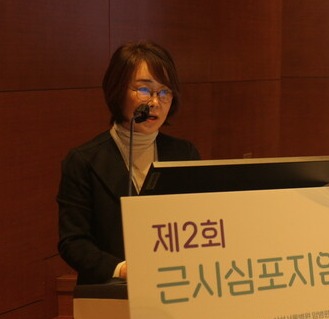As vision-correction products, including glasses to slow the progression of myopia, are being introduced to the market, experts pointed out that specialty lens treatment for children is a medical practice and should be performed by eye care specialists.
Pediatric ophthalmologists raised the issue after a lens company recently launched myopia correction and progression control glasses and promoted them with the phrase “consult an optometrist.”

On Monday, the Korean Association for Pediatric Ophthalmology and Strabismus and the Korean Society for Pediatric and Adolescent Myopia Research released a statement titled “Position on Prescription of Myopia Relief Specialty Lenses.”.
According to them, myopia-relieving lenses are a treatment method that prescribes eyeglass lenses based on accurate refractive values to suppress myopia progression.
However, unlike adults, children's refractive error varies greatly, so it is necessary to accurately measure it through accommodative paralysis refraction and keratometry before prescribing spectacle lenses.
Unlike simple prescription glasses, treatment with myopia-reducing lenses involves medical procedures, such as putting an antidote in the eye to find the correct number of degrees. Therefore, experts said, it must be diagnosed and prescribed by an ophthalmologist.
In addition, since myopia-relieving lenses cannot completely suppress myopia as the child grows, it is necessary to periodically evaluate the degree of myopia progression through visual acuity tests and eye length tests and replace the lenses as needed to maintain the effectiveness of myopia-relieving treatment, they added.
“The care and judgment of an ophthalmologist are essential for myopia-reducing lens treatment to safely and effectively manage myopia in children,” said Professor Paik Hae-Jung of the Department of Ophthalmology at Gachon University Gil Medical Center. “We will do our best to ensure that our children have good eye health throughout their lives through more specialized care and treatment for pediatric myopia.”
Professor Paik is also the president of the Korean Association for Pediatric Ophthalmology and Strabismus and the Korean Society for Pediatric and Adolescent Myopia Research.
Related articles
- Alcon launches solution for personalized vision correction surgery in Korea
- Korea faces urgent call to combat rising myopia crisis in youth
- Distinguishing presbyopia from senile eye disease: myths and facts
- Korea tops Asia in myopia surge among children: expert calls for early intervention
- Myopia, a global phenomenon, can be filtered at 3-year-olds' health checkups
- ‘With steep rise in childhood myopia, half of humanity may be nearsighted by 2050’

